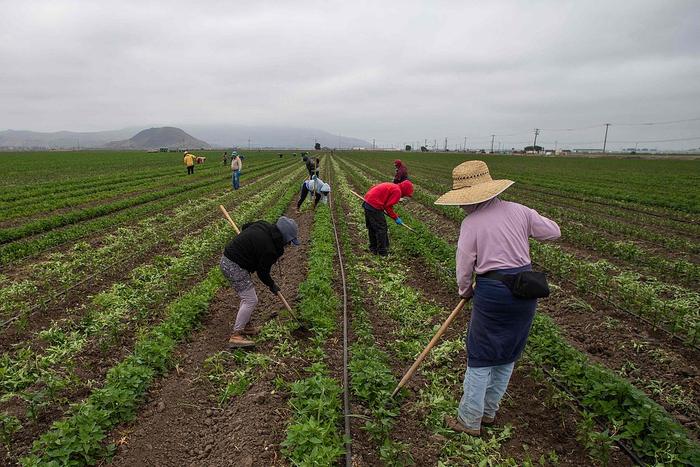
[Report by Ouanchao Net, Shao Yun]
At the beginning of this month, federal law enforcement agencies such as the Immigration and Customs Enforcement (ICE) suddenly began raiding illegal immigrants, leading to a surge in street confrontations, chaos, and conflicts, leaving a trail of confusion. Although the large-scale protests have now subsided, the impact of reduced immigration on the US economy is starting to become apparent.
According to Reuters’ report on June 30th, following the Trump administration’s crackdown on illegal immigrants, many farms in California are facing a “labor shortage” during the harvest season, with crops left unpicked due to the absence of workers. Farmers familiar with the situation mentioned that about 70% of the labor force has stopped working on the fields, and local workers generally are reluctant to take up these jobs. Many farms might collapse under the pressure.
Data from the California Department of Food and Agriculture shows that more than one-third of vegetables and over four-fifths of fruits and nuts in the state are produced in California. The total output value of agriculture and livestock in 2023 was close to $60 billion. However, recent reports from farmers, field managers, and immigrant agricultural workers in various parts of California to Reuters indicate that the ICE raids have led to most workers not coming back to work, affecting harvests.
“I would say that roughly 70% of the workers are gone from the fields,” said Lisa Tate, a sixth-generation farmer from Ventura County, California. “If 70% of the workforce isn’t working, then 70% of the crops will be picked without anyone, and they could spoil within a day. Most Americans don’t want to do this kind of work. Most farmers here barely manage to break even, and I’m worried that this blow could be the tipping point for many people to go bankrupt.”
A farm supervisor from Mexico who preferred to remain anonymous also stated that he was overseeing a field preparing for strawberry planting last week. This field usually had 300 workers, but now there are only 80.
Another supervisor working on different farms mentioned that, normally, there should be 80 people harvesting in his field, but recently only 17 have come.
On June 12, 2025, local time, in Oakland, California, U.S., farm workers are working in the Mexican chili fields.
The report points out that American economists and politicians generally acknowledge that most agricultural workers in the United States are illegal immigrants. Douglas Holtz-Eakin, former Director of the U.S. Congressional Budget Office and a Republican economist, said that about 80% of the agricultural workers in the United States were born abroad, nearly half of whom do not have legal status. The sudden decrease in these worker numbers could cause “catastrophic impact” to the U.S. agricultural food supply chain economy.
It is reported that many illegal immigrant agricultural workers worry that if they are caught, they will no longer be able to see their families. “We wake up every morning scared,” said an illegal immigrant agricultural worker, “We’re worried about the sun, heat, and now there’s another big problem—many people can’t go home. I try to avoid trouble on the street. Now, regardless of the reason for being arrested, you’ll be deported.”
However, according to Reuters, community organizations for agricultural workers anticipate that although there may be a decline in work rates during the first few days of the search operation, most illegal agricultural workers will return to work in the short term because they have no other sources of income. The report states that to reduce contact with federal law enforcement, many people are taking measures, such as sharing rides with people with legal status or having their children go to the supermarket with American citizenship.
It is worth mentioning that President Trump himself acknowledged on his own social media platform Truth Social this month that ICE’s search operations indeed took away many “very good long-term workers,” who “cannot be replaced by others.”
He publicly stated to the media that American farmers “have been severely harmed,” noting that they had excellent workers who were not citizens but performed exceptionally well.
Trump promised to issue an executive order to address this impact, but to date, no policy changes have been made. White House spokesperson Anna Kelly responded to a Reuters inquiry by stating, “President Trump has always been steadfast in his support for farmers. He will continue to strengthen our agricultural industry, expand exports, and fulfill his commitments on immigration enforcement.”
Bernard Yaros, the chief economist of the United States at the Oxford Economics Institute, pointed out in a report released on June 26 that domestically born workers often find it difficult to fill the gap left by immigrants, as they typically work in different fields.
Greg Tesch, who operates a farm in central California, also mentioned that illegal immigrant agricultural workers have become an important part of the US agricultural supply chain. “If crops are ripe, like the sweet peppers we grow next door, if they’re not picked within two or three days, they can be sunburned or overripe. We need these laborers,” he said.
Tesch also noted that even legal immigrants feel the chill of Trump’s crackdown policies. “We all know that there are both people with papers and those without,” Tesch said, “When people hear the word ‘ICE’, nobody feels safe, not even those with papers.”
This article is an observation from ChinaObserver.com.